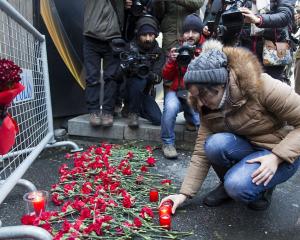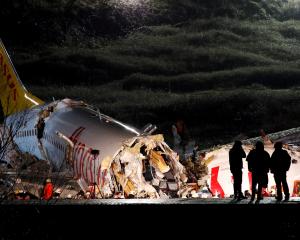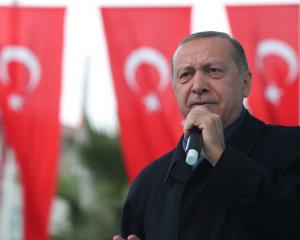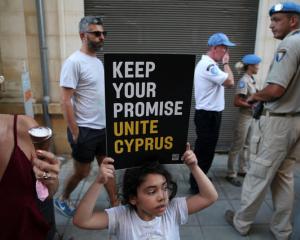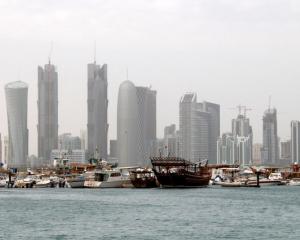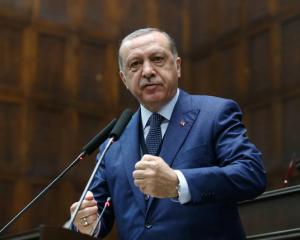Hundreds of police and protesters have been injured since Friday in the riots, which began with a demonstration to halt construction in a park in an Istanbul square and grew into mass protests against what opponents call Erdogan's authoritarianism.
He has dismissed the protests as the work of secularist enemies who never reconciled to the mandate of his Islamist AKP party, which has won three straight elections, overseen an economic boom and raised Turkey's profile in the region.
"This is a protest organised by extremist elements," Erdogan said at a news conference before departing on a trip to North Africa. "We will not give away anything to those who live arm in arm with terrorism."
"Many things have happened in this country, they've hanged, they've poisoned, but we will walk towards the future with determination and through holding onto our values," he added, an allusion to Turkey's murky past of military coups and covert action by militant secularist forces.
The unrest has delivered a blow to Turkish financial markets that have thrived under Erdogan. Shares fell more than six percent and the lira fell to 16-month lows.
Erdogan said the protesters had no support in the general population and he gave no indication he was preparing any concessions.
Protesters accuse Erdogan of furthering a hidden Islamist agenda in a country with a secularist constitution. Some object to tightening restrictions on alcohol sales and other measures seen as religiously motivated. Others complain of the costs from Erdogan's support of rebels in neighbouring Syria's civil war.
Still others have economic grievances, viewing the disputed development project in Istanbul's Taksim Square as emblematic of wild greed among those who have benefited from Turkey's boom.
Protesters gathered in Taksim again on Monday. Barricades of rubble hindered traffic along the Bosphorus waterway and blocked entry into the area. Leftist groups hung out red and black flags. Tear gas lingered in the warm, damp air.
Banners called on Erdogan to resign and declared: "Whatever happens, there is no going back."
Nearby walls were plastered with cartoon posters of an image borrowed from a photograph of a policeman spraying tear gas at a young woman in a red summer dress, adopted as an emblem of aggressive police conduct. The caption read: "The more they spray, the bigger we get."
Istanbul police kept a low profile on Monday morning and were not to be seen around the main gathering points at Taksim and the area of Besiktas. In the capital Ankara, however, police again fired tear gas again at protesters.
Erdogan appeared to reject accusations by the United States and the European Union, sensitive to Turkey's strategic position on the edge of the Middle East and bordering Syria and Iraq, of heavy handed police action.
"We...are behaving in a very restrained way," he said.
"Be calm, relax," he advised the public. "All this will be overcome."
"FUEL TO THE FIRE"
The protests had appeared to ease off on Saturday night, but were re-ignited by defiant comments by Erdogan on Sunday afternoon describing the protesters as "a few looters" driven on by the opposition Republican People's Party (CHP).
"Rather than try to calm the situation...some of Mr Erdogan's public statements about the protesters have added fuel to the fire," Robert O'Daly, Turkey Analyst at The Economist Intelligence Unit, said. "Mr Erdogan appears to have underestimated the mood in the country.
"The absence of an effective opposition in parliament during the ten years that the AKP and Mr Erdogan have been in power has reduced the constraints on government. As a result, Mr Erdogan and his government appear out of touch, going ahead with pieces of legislation or in this case an urban development project without much consultation."
The CHP said it was being used as a scapegoat for Erdogan's failure to read the public mood.
"The people on the street across Turkey are not exclusively from the CHP, but form all ideologies and all parties," senior CHP member Mehmet Akif Hamzacebi told Reuters. "What Erdogan has to do is not to blame CHP but draw the necessary lessons from what happened."
Erdogan has given no indication he is preparing any concessions. Certainly, with his strong support, especially in the heartland of Anatolia, he seems for now safe in his post.
He said plans would go ahead to re-make Taksim Square, long a rallying point for demonstrations, including construction of a new mosque and the rebuilding of a replica Ottoman-era barracks.
Protests have involved a broad spectrum in dozens of cities, from students to professionals, trade unionists, Kurdish activists and hardline secularists who see Erdogan seeking to overthrow the secularist state set up by Mustafa Kemal Ataturk in 1923 in the ruins of the Ottoman Empire.
Since taking office, Erdogan has dramatically cut back the power of the army, which ousted four governments in the second half of the 20th century and which hanged and jailed many, including a prime minister. In 1997 Turkey's first Islamist government was eased from office by the military.
Hundreds of officers, including senior generals, have been jailed in the last year over an alleged coup plot against Erdogan and his AK Party. Journalists, artists and businessmen have also been locked up.
Erdogan remains far and away the most popular politician, and pointed to his electoral mandate, won since 2002 on the virtual ruin of traditional parties mired in corruption and mismanagement scandals.
"The fact the AK Party has increased its votes at three elections in a row and has successfully won two referendums, shows how the people of this nation have embraced the AK Party," he said.
Turkey remains in many ways a country divided into a more conservative religious heartland and a liberal elite wary of religious inroads. They view with particular suspicion Erdogan's moves to end restrictions on the Islamic headscarf, increase restrictions on alcohol and his enthusiastic advocacy of a huge new mosque to be built on the banks of the Bosphorus.


